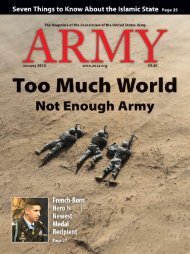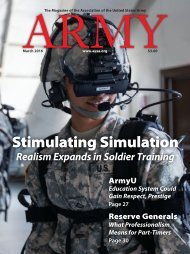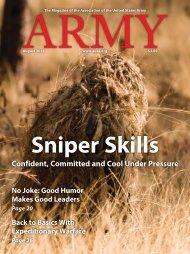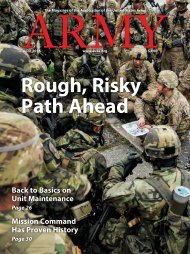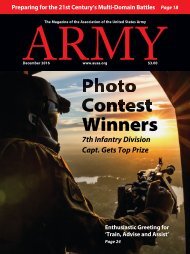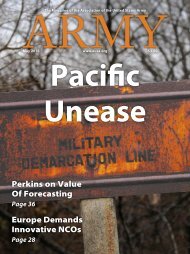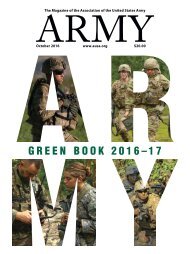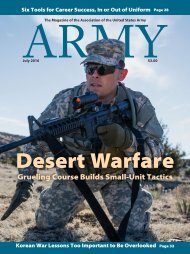All About - History - Nero - Rome's Deadliest tyrant
All About History offers a energizing and entertaining alternative to the academic style of existing titles. The key focus of All About History is to tell the wonderful, fascinating and engrossing stories that make up the world’s history.
All About History offers a energizing and entertaining alternative to the academic style of existing titles. The key focus of All About History is to tell the wonderful, fascinating and engrossing stories that make up the world’s history.
You also want an ePaper? Increase the reach of your titles
YUMPU automatically turns print PDFs into web optimized ePapers that Google loves.
Artists in Arms<br />
Robert Capa and Gerda Taro, 1936. A<br />
year later, Taro would be killed while<br />
covering the Battle of Brunete<br />
the POUM, wanted to fight a revolutionary war,<br />
encouraging mass involvement by promoting a<br />
social revolution even as war raged. Moderates<br />
wanted to delay the revolution until after the war<br />
was won. When the two sides clashed, Orwell sided<br />
with the revolutionaries. Communist-led moderate<br />
forces prevailed in this civil war within the civil<br />
war, with the result that Orwell fled Spain for fear<br />
of being arrested and jailed. Back in England, he<br />
wrote Homage To Catalonia, a record of not only<br />
his military experience in Spain but also of the<br />
internecine political struggle that plagued the<br />
Republic. His contempt for communism<br />
would never leave him.<br />
The American writer Ernest<br />
Hemingway, too, made his way<br />
to Spain, which was a country<br />
TheheadquartersofthePOUMin<br />
Barcelona, 1936. George Orwell is<br />
presentinthebackgroundoftheimage<br />
he knew well and loved; his sympathies were<br />
veryclearlywiththeRepublic.Apartfromhis<br />
newspaperreportsandhisonlyplay,The Fifth<br />
Column, Hemingway also co-wrote (with John Dos<br />
Passos) the 1937 film The Spanish Earth. Directedby<br />
JorisIvensandnarratedbyOrsonWelles,thefilm’s<br />
pro-Republican stance was unambiguous. The most<br />
famous literary manifestation of Hemingway’s<br />
experience of the war is, however, his novel For<br />
WhomTheBellTolls, which tells the fictional story<br />
of an American volunteer for the International<br />
Brigades. Published in 1940, it was followed three<br />
yearslaterbyafilmofthesametitlestarringIngrid<br />
Bergman and Gary Cooper.<br />
ForSpanishwriters,theoutbreakofwartriggered<br />
an outburst of activity across all the literary forms.<br />
They wished to show their support for the war<br />
and the revolution by putting pen to paper, using<br />
literature to promote commitment to the cause.<br />
One such writer was Miguel Hernández, whose<br />
commitment to the burning social issues of the<br />
day had led him to join the Communist Party of<br />
Spain. After the outbreak of war, he exemplified<br />
the unity of cultural and military activity in the<br />
Republic. He enlisted with Republican forces and<br />
also gave poetry readings at the front to boost the<br />
soldiers’ morale. He survived the war, but like so<br />
many who had supported the Republic, he<br />
fell victim to Franco’s extraordinary<br />
vindictiveness, and was sentenced<br />
to death before succumbing to<br />
tuberculosis in captivity in 1942.<br />
The International<br />
Brigades<br />
People from all over the<br />
world made their way to<br />
Spain to fight for the Republic<br />
The Spanish Civil War attracted international attention<br />
like no other event at that time. <strong>All</strong> over the world people<br />
were so incensed at the Spanish generals’ grasp for power,<br />
and at the failure of governments to intervene to save<br />
Spain’s democracy, that they resolved to take up arms<br />
themselves. Most of these foreign volunteers served in<br />
the International Brigades.<br />
The driving forces behind the International Brigades<br />
were the communist parties, which existed in many<br />
countries and followed the lead set by the Soviet Union.<br />
In countries such as Britain, France, the United States and<br />
Australia, communists assembled recruitment networks,<br />
so that those willing to fight in Spain could be gathered<br />
together and then sent for training and deployment in<br />
Spain. As so many states had committed themselves to<br />
non-intervention, the sending of volunteers had to take<br />
place in a clandestine manner.<br />
Altogether something in the order of 40,000<br />
volunteers served in the International Brigades, most in<br />
combatant roles. Typically they would fight in a unit of<br />
their countrymen, named after a national hero. German<br />
volunteers, for example, served in the Thälmann Battalion,<br />
named after the imprisoned German communist leader<br />
Ernst Thälmann. Altogether nearly 6,000 members of the<br />
International Brigades gave their lives for the Republic.<br />
19 NOVEMBER 1933 OCTOBER 1934 SEPTEMBER 1935 16 FEBRUARY 1936 JULY 1936<br />
THE RIGHT<br />
TAKES OVER<br />
Right-wing parties are successful<br />
in the general election; the new<br />
coalition government begins<br />
to undo the reforms that were<br />
introduced by its predecessor.<br />
UPRISING IN<br />
THE ASTURIAS<br />
A workers’ revolt in the Asturias<br />
in northern Spain is brutally put<br />
down by military forces; a key figure<br />
in crushing the strike is General<br />
Francisco Franco.<br />
THE POPULAR<br />
FRONT<br />
To counter the power of the rightwing<br />
ruling parties, republicans,<br />
socialists and communists form a<br />
coalition, which is known as the<br />
Popular Front.<br />
THE LEFT<br />
TRIUMPHANT<br />
The Popular Front is successful in<br />
general elections that are held on<br />
16 February; the new government<br />
will go on to implement a program<br />
of reform.<br />
COUNTDOWN<br />
TO WAR<br />
While a number of generals<br />
including Francisco Franco plan a<br />
coup, there are increasing incidents<br />
of violence and politically motivated<br />
assassinations in Spain.<br />
© Alamy, xxxxxxxx<br />
55




